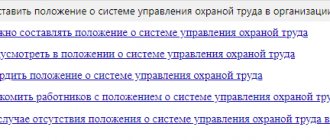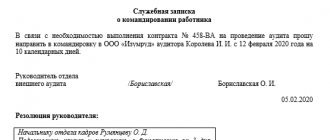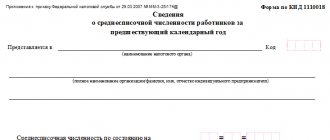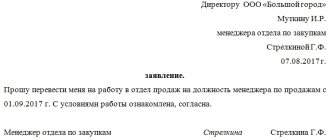The general procedure for hiring and firing employees in organizations is implemented according to a similar scheme. When performing such procedures, the employer must strictly adhere to the requirements of the law (Labor Code of the Russian Federation). At the same time, it is necessary to take into account the specifics of registration of employment and termination of an employment contract, depending on the circumstances that arise.
Also see:
- Why they can be fired from work: grounds under the Labor Code of the Russian Federation and reasons in practice
- How to properly make personnel records about dismissal
What should a company do when hiring an employee?
Enterprises select candidates for employment through bulletin boards on various websites, recruitment agencies, advertising on television, and sending information about vacancies to the employment service. In the search information, they indicate the requirements for the ranks, qualifications and experience of the employee that they need to perform a specific job.
Citizens who want to get a job, as a rule, send a resume to a potential employer or fill out a form with their personal data and a description of their education, work experience in their specialty, and individual advantages.
IMPORTANT!
The information in the questionnaires is classified as the applicant’s personal data, so the text must include the person’s consent to receive and process it.
After analyzing the applications received, candidates are selected to fill the vacancy and assigned one or more interviews. Based on their results, the applicant is selected for the job. Next, the admission process follows the standard procedure.
The issuance of an order for employment and the signing of an employment contract must occur within 3 days from the date of actual admission to work (Article 67 and the Labor Code of the Russian Federation).
The employee gets acquainted with the order against signature.
The employment contract is drawn up in 2 copies: one remains with the employer, and the second is given to the employee.
Is a pre-employment medical examination required?
Certain categories of workers must undergo a medical examination before starting the employment procedure. These include:
- minors under 18 years of age;
- workers employed in harmful and dangerous areas, in the Far North, as well as on shifts;
- workers in the food industry, catering, trade, waterworks, medical organizations and child care institutions.
IMPORTANT!
The costs of the medical examination are borne by the employer (paragraph 12, part 2, article 212, part 8, article 213 of the Labor Code of the Russian Federation.)
In what cases may additional documents be required upon admission?
Although the Labor Code of the Russian Federation contains an exhaustive list of what an employee must provide upon employment, in certain circumstances this list can be expanded .
In addition to the above documents, in some cases you also need:
- certificate and the nature of working conditions at the main place of work - for part-time workers;
- medical certificate on admission to residence in the Far North;
- work permit or patent for foreign workers temporarily staying in the territory of the Russian Federation.
In addition, when applying for some government positions, information about the income, property and property obligations of both the candidate and his family members may be required.
How does the dismissal of a worker proceed?
The specific procedure for registering dismissal and paying an employee depends on the reasons for which he leaves the company. The Labor Code of the Russian Federation clearly defines their list:
- By agreement of the parties to the employment contract - Art. 78 Labor Code of the Russian Federation.
- Due to the expiration of the contract - Art. 79 Labor Code of the Russian Federation.
- On the worker’s own initiative – Art. 80 Labor Code of the Russian Federation.
- At the initiative of the employer - Art. 81 Labor Code of the Russian Federation:
- For culpable reasons: repeated violation of labor duties;
- one-time gross violation of labor discipline;
- guilty actions giving grounds for loss of trust.
- For innocent reasons: liquidation of the employer;
- staff reduction;
- inadequacy for the position held;
- change of owner of the company (for company managers).
5. Due to circumstances beyond the control of the parties - Art. 83 Labor Code of the Russian Federation.
Features of dismissal in the order of transfer to another organization
To better understand the depth of the issue, let's start with a definition.
Dismissal by transfer is the termination of an employee’s contract (employment contract) with one employer and its simultaneous conclusion with another employer.
For example, an employee occupies a permanent position in one organization, but he was offered a more profitable job at another enterprise. Then he can transfer from one place of work to another. In fact, the employee quits the old enterprise and gets a job at a new one.
This is also important to know:
Probation period: Articles 70, 71 of the Labor Code of the Russian Federation
But before dismissing a transfer employee, the manager must have certain reasons. This is a letter of invitation from a future employer to a present one. Subject to the employee's consent and written request, the current manager may dismiss the transfer employee.
The Labor Code does not prescribe a clear algorithm for the manager’s action in this case. Mention of transfer to another organization can be found in Article 77 of this document. Therefore, when preparing documents for dismissal due to transfer, reference is made to Article 77 of the Labor Code of the Russian Federation.
In fact, business managers do not receive much benefit from this process. The same cannot be said about the employees. In case of dismissal in this way, the state protects the rights of the citizen, thanks to which he receives 100% employment.
List of grounds for starting the dismissal procedure
Initiation of the procedure for terminating the employment relationship begins with the basis document. This is as follows:
- If the parties agree, a written bilateral agreement between the participants in the labor relationship indicating the conditions, date of separation, and additional payments due.
- If there is an employee’s will to leave, his personal statement.
- If a fixed-term contract is terminated strictly on the date specified in it or upon the occurrence of an event that is designated in it as a circumstance sufficient for its termination. In the latter case, there must be a document recording the occurrence of such a circumstance.
- When terminating an employment contract by decision of the administration, the basis documents differ:
- if there are guilty actions, it is necessary to prepare the entire package of documents to impose a disciplinary sanction: acts of violation, orders to conduct an internal investigation, acts based on the results of an internal investigation, written explanations of the employee;
- if the reason for the employer’s decision was other reasons, then sufficient documents will be: in case of liquidation - a decision of the owners of the company, executed in writing by them, or a court decision to terminate activities;
- in case of reduction - an order from the administration to reduce the number or staff;
- the employee’s inadequacy for the position held must be confirmed by a decision of the certification commission, drawn up in writing;
- no additional documents are needed to dismiss the manager, except for a decision drawn up in the prescribed form .
- If the relationship is terminated for beyond the control of the parties, the basis is a document confirming the occurrence of an unfavorable event that makes it impossible to continue cooperation and forces the parties to separate.
Regulations for dismissal of an employee
2.3. Official wages + official vacation pay are transferred to the card on the employee’s last working day. If not, then print the package of documents from 1C (section “Directories” - “Employees” - “Create” - fill out the form - “Record and close” - “Print” - “Package of documents”) ATTENTION. CORRECTIONS TO THE EMPLOYMENT RECORD ARE NOT ALLOWED.
Therefore, it is necessary to fill it out in accordance with the data specified in
“Order on termination of the employment contract (dismissal)”
How to formalize dismissal
After receiving the basis document, the separation procedure begins, which in all cases includes a unified procedure for formalizing the dismissal of an employee:
- Issuance of an order - in any form or using form No. T-8 or T-8a.
- Registration of records of dismissal - in the work book and register of information on labor details, personal card.
- Accrual of all due payments to the departing employee and preparation of a settlement note.
- Preparation of documents for issuance to the employee on his last working day - certificates of income and taxes paid, certificates of earnings for 2 years preceding the year of dismissal, extracts from the forms SZV-STAZH, SZV-M, RSV.
- Issuance of full payroll and all required documents to the employee on the day of dismissal.
- Familiarization with his signature with the order of dismissal.
Regulations on a unified procedure for registering the hiring and dismissal of employees
One copy of the employment contract is given to the employee, the other is stored in the personnel department of the enterprise.
1.4. Documents presented when concluding an employment contract.
When applying for a job, the applicant presents to the personnel service: - a passport or other identification document; — a work record book drawn up in the prescribed manner, except in cases where an employment contract is concluded for the first time or the employee enters a part-time job; — insurance certificate of pension insurance; - military registration documents - for those liable for military service and persons subject to conscription for military service; - a document on education, qualifications or special knowledge - when applying for a job that requires special knowledge or special training; — other documents, the presentation of which is provided for by the current legislation of the Russian Federation.
A note in the work book is made by the employer in accordance with the Labor Code, and the justification for dismissal is formulated indicating an article, part of an article or paragraph. The order is filled out by a personnel service employee, signed by the head of the organization or a person authorized by him and announced to the employee against signature. Based on the order to terminate the employment contract, an entry is made in the personal card (Form No. T-2), personal account (Form No. T-54), work book, and settlement is made with the employee using Form No. T-61
“Note for settlement upon termination of an employment agreement (contract) with an employee”
Features of the dismissal procedure for certain reasons
When a worker leaves on his own initiative, he is obliged to notify the employer of his decision in advance. As a result, the application must be submitted:
- manager - at least 1 month before the date of departure;
- for those working under a fixed-term contract - at least 3 days ;
- in other cases - no later than 2 weeks before the date of dismissal.
By agreement with the employer or if there are objective reasons that make continuation of work impossible (Part 3 of Article 80 of the Labor Code of the Russian Federation), the employee’s departure can be formalized without work.
IMPORTANT!
The presence of valid reasons for dismissal without service must be recorded in the application.
In case of liquidation or layoff, the employer is obliged to notify the employee 2 months before the date of his departure. He must also offer him other available vacancies that remain on staff and in which the employee can continue to work.
By agreement between the parties to the employment contract, the employee may not complete the remainder of the notice period for dismissal, but leave immediately, having received average earnings during this time. Upon dismissal on this basis, the employee is paid an additional 1 month .
the 2nd and 3rd months may be retained (Article 178 of the Labor Code of the Russian Federation).
In some cases - upon dismissal due to circumstances beyond the control of the parties - the worker is entitled to payment of severance pay in the amount of 2 weeks of average earnings. For example:
- conscription;
- dismissal due to significant changes in the terms of the employment contract that make it impossible to continue the employment relationship.
After the worker leaves, orders for the hiring and dismissal of workers are placed in an archive and stored there for at least 50 years .
Read also
29.09.2018
PROCEDURE FOR HIRING AND DISMISSING EMPLOYEES
Home Favorites Random article Educational New additions Feedback FAQ⇐ PreviousPage 2 of 7Next ⇒
Recruitment
a) When hiring, the employer enters into an employment contract with the employee.
Employment contracts can be concluded:
-For undefined period;
- for a certain period of no more than five years (fixed-term employment contract), unless a different period is established by the Labor Code of the Russian Federation and other federal laws.
If the employment contract does not specify the duration of its validity, the contract is considered to be concluded for an indefinite period.
In the event that neither party has requested termination of a fixed-term employment contract due to its expiration and the employee continues to work after the expiration of the employment contract, the condition on the fixed-term nature of the employment contract loses force and the employment contract is considered concluded for an indefinite period.
An employee has the right to enter into employment contracts to perform other regular paid work in his free time from his main job with the same employer (internal part-time job) and (or) with another employer (external part-time job).
With the written consent of the employee, he may be assigned to perform, during the established duration of the working day (shift), along with the work specified in the employment contract, additional work in a different or the same profession (position) for additional pay. The period during which the employee will perform additional work, its content and scope are established by the employer with the written consent of the employee.
b) Contents of the employment contract:
- last name, first name, patronymic of the employee and the name of the employer who entered into the employment contract;
— information about the employee’s identity documents;
— information about the employer’s representative who signed the employment contract, and the basis on which he is vested with the appropriate powers;
— place and date of conclusion of the employment contract;
— place of work (indicating the structural unit);
— labor function (work according to the position in accordance with the staffing table, profession, specialty indicating qualifications, the specific type of work assigned to the employee);
— start date of work;
— conditions of remuneration (including the size of the tariff rate or salary (official salary) of the employee, additional payments, allowances and incentive payments);
— working hours and rest hours (if for a given employee it differs from the general rules established at UAZ OJSC).
— compensation for hard work and work with harmful and (or) dangerous working conditions, if the employee is hired in appropriate conditions, indicating the characteristics of working conditions in the workplace;
— a condition on compulsory social insurance of the employee in accordance with the Labor Code of the Russian Federation and other federal laws;
— on non-disclosure of secrets protected by law (state, official, commercial and other);
- on the employee’s obligation to work after training for no less than the period established by the contract, if the training was carried out at the expense of the employer;
- about the test;
The absence of a probationary clause in the employment contract means that the employee was hired without a trial.
The probationary period cannot exceed three months, and for certain categories of workers - six months. The period of temporary incapacity for work and other periods when the employee was actually absent from work are not included in the probationary period.
If the test result is unsatisfactory, the employer has the right to terminate the employment contract with the employee before the expiration of the test period by warning him in writing no later than three days in advance, indicating the reasons that served as the basis for recognizing this employee as having failed the test.
If the test result is unsatisfactory, the employment contract is terminated without taking into account the opinion of the trade union body and without payment of severance pay.
If the probation period has expired and the employee continues to work, then he is considered to have passed the test and subsequent termination of the employment contract occurs only on a general basis.
- other conditions that do not worsen the employee’s position in comparison with established labor legislation and other regulatory legal acts containing labor law norms, collective agreements, agreements, local regulations.
If, when concluding an employment contract, any information and (or) conditions were not included in it, then the missing information is entered directly into the text of the employment contract, and the missing conditions are determined by an annex to the employment contract or a separate agreement of the parties, concluded in writing, which are an integral part of the employment contract.
c) The procedure for concluding an employment contract
When concluding an employment contract, a person applying for work presents to the employer:
— passport or other identification document;
— work record book (except for cases when an employment contract is concluded for the first time or an employee starts working on a part-time basis);
— insurance certificate of state pension insurance (except for cases when an employment contract is concluded for the first time);
- military registration documents - for those liable for military service and persons subject to conscription for military service;
- a document on education, qualifications or special knowledge - when applying for a job that requires special knowledge or special training.
In some cases, taking into account the specifics of the work, it may be necessary to present additional documents when concluding an employment contract.
It is prohibited to require from a person applying for a job documents other than those provided for by the labor legislation of the Russian Federation and other federal laws.
A person entering work undergoes a preliminary medical examination at the expense of the employer in order to determine his suitability for performing the assigned work.
When concluding an employment contract for the first time, a work book and an insurance certificate of state pension insurance are issued by the employer.
If a person applying for work does not have a work book due to its loss, damage or other reason, the employer is obliged, upon a written application from this person (indicating the reason for the absence of a work book), to issue a new work book.
The work book is the main document about the employee’s work activity and length of service.
The employer keeps work books for each employee who has worked at UAZ OJSC for more than five days, in the case where the work is the main one for the employee.
The work book contains information about the employee, the work he performs, transfers to another permanent job and the dismissal of the employee, as well as the grounds for termination of the employment contract and information about awards for success in work. At the request of the employee, information about part-time work is entered into the work book at the place of main work on the basis of a document confirming part-time work.
d) When hiring (before signing an employment contract), the employer is obliged to:
— familiarize the employee, against signature, with the Internal Labor Regulations, the Regulations “On access and intra-facility regime at OJSC UAZ”, other local regulations directly related to the employee’s work activity, the current collective agreement of OJSC UAZ;
— instruct the employee on labor protection and familiarize him with fire safety rules;
— familiarize the employee with the job function, safe methods and techniques for performing work, handling equipment, tools and other tools.
e) The employment contract is concluded in writing, drawn up in two copies, each of which is signed by the parties. One copy of the employment contract is given to the employee, the other is kept by the employer. The employee’s receipt of a copy of the employment contract must be confirmed by the employee’s signature on the copy of the employment contract kept by the employer.
Hiring is formalized by an order (instruction) of the employer, issued on the basis of a concluded employment contract. The content of the order (instruction) of the employer must comply with the terms of the concluded employment contract. The employer's order (instruction) on hiring is announced to the employee against signature within three days from the date of actual start of work.
f) The employment contract comes into force from the day it is signed by the employee and the employer, unless otherwise established by federal laws, other regulatory legal acts of the Russian Federation or the employment contract, or from the day the employee is actually admitted to work.
The employee is obliged to begin performing his job duties on the date specified in the employment contract. If the employee does not start work on the start date, the employer has the right to cancel the employment contract. A canceled employment contract is considered unconcluded.
g) Upon a written application from the employee, the employer is obliged, no later than three working days from the date of filing this application, to provide the employee with copies of documents related to work (hiring orders, orders on transfers to another job, orders on dismissal from work; extracts from the work book ; certificates of wages, accrued and actually paid insurance contributions for compulsory pension insurance, period of work with a given employer, etc.). Copies of work-related documents must be properly certified and provided to the employee free of charge.
h) Changing the terms of the employment contract determined by the parties, including transfer to another job, is allowed only by agreement of the parties to the employment contract. An agreement to change the terms of an employment contract determined by the parties is concluded in writing.
Dismissal of employees
Termination of an employment contract is carried out only on the grounds provided for by the labor legislation of the Russian Federation.
a) Termination of an employment contract at the initiative of the employee (at his own request)
In this case, the employee must notify the employer in writing no later than two weeks before dismissal. The specified period begins the next day after the employer receives the employee’s resignation letter.
By agreement between the employee and the employer, the employment contract can be terminated even before the expiration of the notice period for dismissal.
In cases where the employee’s application for dismissal on his initiative (at his own request) is due to the impossibility of continuing his work (enrollment in an educational institution, retirement and other cases), as well as in cases of established violation by the employer of labor legislation and other regulatory legal acts, the employer is obliged to terminate the employment contract within the period specified in the employee’s application.
Before the expiration of the notice period for dismissal, the employee has the right to withdraw his application at any time. Dismissal in this case is not carried out unless another employee is invited in his place in writing, who, in accordance with the Labor Code and other federal laws, cannot be denied an employment contract.
b) Termination of an employment contract at the initiative of the employer
An employment contract can be terminated by the employer in the following cases:
§ liquidation of the organization;
§ reduction in the number or staff of the organization’s employees;
§ the employee’s inconsistency with the position held or the work performed due to insufficient qualifications confirmed by certification results;
§ change of owner of the organization’s property (in relation to the head of the organization, his deputies, the chief accountant);
§ repeated failure by an employee to fulfill work duties without good reason, if he has a disciplinary sanction;
§ one-time gross violation by an employee of labor duties:
- absenteeism, i.e. absence from the workplace without good reason during the entire working day (shift), regardless of its duration, as well as in the case of absence from the workplace without good reason for more than four hours in a row during the working day (shift);
— the employee’s appearance at work (at his workplace or on the territory of the organization) in a state of alcohol, narcotic or other toxic intoxication;
— disclosure of secrets protected by law (state, commercial, official and other) that became known to the employee in connection with the performance of his job duties, including disclosure of personal data of another employee;
- committing at the place of work theft (including small) of someone else’s property, embezzlement, intentional destruction or damage, established by a court verdict that has entered into legal force or a decision of a judge or official authorized to consider cases of administrative offenses;
— a violation of labor safety requirements by an employee established by the labor safety commission or the labor safety commissioner, if this violation entailed serious consequences (industrial accident, breakdown, catastrophe) or knowingly created a real threat of such consequences;
- committing guilty actions by an employee directly servicing monetary or commodity assets, if these actions give rise to a loss of confidence in him on the part of the employer;
— the employee submits false documents to the employer when concluding an employment contract;
- in other cases established by the labor legislation of the Russian Federation and other federal laws.
Dismissal due to a reduction in the number or staff of the Company's employees or due to the employee's inadequacy for the position held or work performed due to insufficient qualifications confirmed by certification results is permitted if it is impossible to transfer the employee with his written consent to another job available to the employer (as a vacant position or a job corresponding to qualifications of the employee, as well as a vacant lower-level position or lower-paid work), which the employee can perform taking into account his state of health.
It is not allowed to dismiss an employee at the initiative of the employer (except in the case of liquidation of the organization) during the period of his temporary incapacity for work and while on vacation.
When conducting certification, which may serve as a basis for dismissal of employees, a representative of the elected body of the relevant primary trade union organization must be included in the certification commission.
c) Termination of an employment contract by agreement of the parties
In this case, the employment contract can be terminated at any time by agreement of the parties to the employment contract. The agreement of the parties is drawn up in writing, indicating mutual obligations. The agreement may provide for the payment of a sum of money in an amount determined by the parties.
d) Termination of an employment contract due to circumstances beyond the control of the parties
The employment contract is subject to termination due to the following circumstances beyond the control of the parties:
- conscription of an employee into military service or sending him to an alternative civilian service that replaces it;
- reinstatement of an employee who previously performed this work by decision of the state labor inspectorate or court;
- failure to be elected to office;
- sentencing of an employee to a punishment that precludes the continuation of previous work, in accordance with a court verdict that has entered into legal force;
— recognition of the employee as completely incapable of working in accordance with a medical certificate issued in the manner established by federal laws and other regulatory legal acts of the Russian Federation;
- death of an employee;
— the occurrence of emergency circumstances that prevent the continuation of labor relations (military operations, catastrophe, natural disaster, epidemic, etc.);
— disqualification or other administrative punishment that precludes the employee from fulfilling his duties under the employment contract;
— cancellation of a court decision or cancellation (recognition as illegal) of a decision of the state labor inspectorate to reinstate an employee at work.
e) Termination of a fixed-term employment contract
In this case, the employment contract is terminated upon expiration of its validity period. The employee must be notified in writing of the termination of the employment contract at least three calendar days before dismissal, except in cases where the fixed-term employment contract concluded for the duration of the duties of the absent employee expires.
An employment contract concluded for the duration of a specific work is terminated upon completion of this work.
An employment contract concluded for the duration of the duties of an absent employee is terminated when this employee returns to work.
An employment contract concluded to perform seasonal work during a certain period (season) is terminated at the end of this period (season).
f) Procedure for registering termination of an employment contract
Termination of an employment contract is formalized by an order (instruction) of the employer, with which the employee must be familiarized with signature. At the request of the employee, the employer is obliged to provide him with a duly certified copy of the specified order (instruction). In the event that an order (instruction) to terminate an employment contract cannot be brought to the attention of the employee or the employee refuses to familiarize himself with it against signature, a corresponding entry is made on the order (instruction).
In all cases, the day of termination of the employment contract is the employee’s last day of work.
On this day, the employer is obliged to issue the employee a work book and make a final payment to him. Upon written application by the employee, the employer is also obliged to provide him with duly certified copies of documents related to work.
⇐ Previous2Next ⇒








